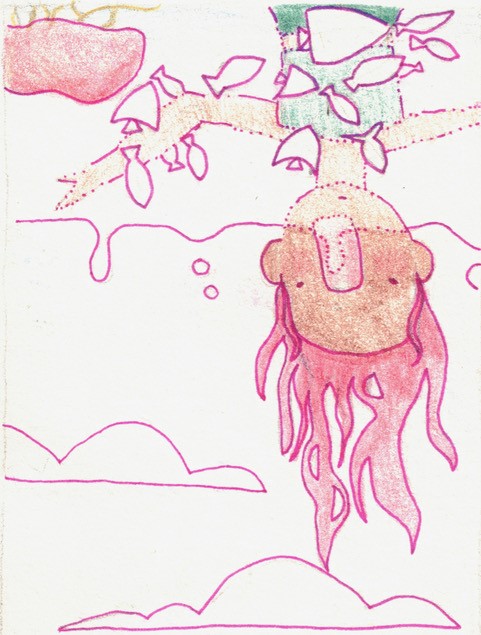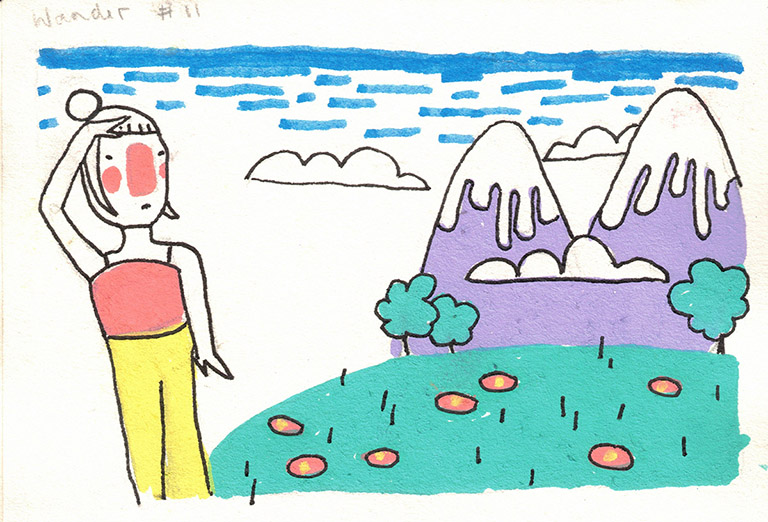Leah Beldman is finishing her fourth year of university, studying social sciences, music and theology. Paintings by Kate Beldman.


Craft is a covenant. As an artist, I have entered a covenant of writing – a commitment to be faithful in my creativity and creative in my commitment. This is a breathing promise to be truthful and disciplined, allowing myself to shape and be shaped by imagination.
Truth. The words I write must be truthful. True to me. True to God. True to others. Not truth that is loud and obnoxious – the kind that is preached from stiff pulpits or picket signs, determined by gavels. This truth accompanies the spit flying from the mouths of debaters, landing on audiences who long for connection.
Neither will my writing include quiet truth – truth whispered behind people’s backs which is accompanied by quiet snickers and pointed fingers. This truth worms its way into places where it is unwelcome, disguised as a friend who disarms you with a smile, stealing the one from your face. Unproductive. Unfeeling. Undoing. Undone. Deceitful truth greets you with a warm handshake but leaves you exposed, cold and naked. It pries open your closet door revealing dusty skeletons for the whole world to see.
No. The truth I write will be unifying, not found between the lines of legal documents or under the sour melodies of gossip. Like the laughter and singing coming from the kitchen, this truth will be loud. Like the hidden “I love you” between a mother and daughter walking hand in hand, this truth will be quiet.
The truth I write requires coaxing. It is wild and majestic, like an antlered deer waltzing through the underbrush beneath shadowy sunshine. Truthful ideas must be captured, sometimes tamed, and folded up like crisp, sweet-smelling laundry. Fresh and fitted into compact drawers, they are ready to use.
Discipline. Writing takes practice and experience which is built through effort and mistakes. Discipline means opening drawers full of truthful ideas, pairing those that match and creating a cohesive ensemble. Some days I may be gripped by the fist of divine inspiration, knowing exactly what to write and how to write it. However, divine inspiration is sporadic and passionate. Meetings with inspiration are infrequent and unreliable, leading to work riddled with grammatical errors and mismatching socks.
Discipline is organized and methodical. Habits, although they feel like repeatedly banging your head against a wall, help you to transcend pain, cultivate and practise inspiration. Discipline is suffering. Discipline is suffering that refines you within the laws and covenant rituals of syntax and grammar. Out of these arises a meaningful and truthful story.
In this way, disciplined and truthful writing is an easter narrative. Uncomfortable. Slow. Transformational. Writing demands that you die to your innate nature with all its rebellion and distractions. Death leads to a rebirth or resurrection that allows you to see and write anew.
This new seeing involves more than just your eyes. Simply wearing rose-coloured glasses distorts your vision – a band-aid fix that emphasizes beauty and overlooks brokenness. Seeing anew transforms your eyes. Your mind. Your heart. Your soul. True transformation touches the core of your being, flooding it with imagination and rendering it unrecognizable. It allows you to see the whole story. Plot and subplots. Tension and resolution. Narrative and metanarratives. It introduces a truth that transcends understanding and ushers you into a divine kingdom.
This transformation is why I commit to writing the divine kingdom and letting this kingdom write me.
The Kirby Laing Centre for Public Theology in Cambridge. Charity registered in England and Wales. Charity Number: 1191741
Kirby Laing Centre, The New Mill House, Unit 1, Chesterton Mill, French’s Road, Cambridge, CB4 3NP
© 2022 The Kirby Laing Centre for Public Theology in Cambridge